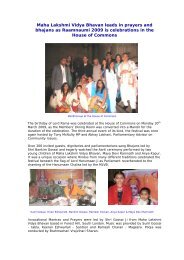Maha Lakshmi Vidya Bhavan Maha Lakshmi Vidya Bhavan
Maha Lakshmi Vidya Bhavan Maha Lakshmi Vidya Bhavan
Maha Lakshmi Vidya Bhavan Maha Lakshmi Vidya Bhavan
Create successful ePaper yourself
Turn your PDF publications into a flip-book with our unique Google optimized e-Paper software.
The Five Great<br />
Daily Duties<br />
~Panch <strong>Maha</strong>yajna~<br />
Regardless of our individual stage in life (Ashram<br />
Dharma) and also our profession, as Hindus we are<br />
required to perform Five Great Daily Duties. These are<br />
minimal practices which guide a person in everyday life,<br />
ensure peace, material and spiritual prosperity.<br />
The Sanskrit word ‘Yajna’ is derived from the root ‘yaj’<br />
which has 3 meanings:<br />
1. Prayer to God.<br />
2. Collective action.<br />
3. Selfless service.<br />
Deeds performed with this triple attitude are called<br />
‘Yajna’. The word ‘Panch’ means five and ‘<strong>Maha</strong>’ means<br />
great. Hindu scriptures, such as the Vedas, Shatpath<br />
Brahmana, Laghu Vishnu Smriti (5-9), Manu Smriti (4-<br />
21), <strong>Maha</strong>bharata and many more, identify 5 great duties<br />
(Panch <strong>Maha</strong>yajna) to be performed in daily life.<br />
These were designed to remind people of their obligations<br />
towards religion, environment, nature, ancestors, elders,<br />
society/nation and all animals. They are not merely<br />
obligations to perform religious rituals, but are social and<br />
moral obligations which have become deeply ingrained<br />
into the Hindu way of life over many centuries.<br />
The idea of ‘Panch <strong>Maha</strong>yajna’ has influenced many<br />
Hindu traditions. Its principles are still followed,<br />
knowingly or unknowingly, by Hindus in their daily life,<br />
even more by those Hindus who do not strictly adhere to<br />
religious practice<br />
52 1982-2007 SILVER JUBILEE<br />
By Shri Ramesh Charan<br />
1 Dev Yajna<br />
Towards Nature<br />
Worship of God in the form of a family deity (Ishta<br />
Devata) in the home shrine, through prayers and<br />
meditations. This practice helps one to become Godconscious<br />
in all daily activities.<br />
Additionally, this practice arouses a sense of<br />
togetherness in the family, since the family members<br />
worship together and participate in rituals, chants,<br />
singing and study of the scriptures. Tradition says that:<br />
“A family that prays together stays together”.<br />
Dev Yajna specifies the protection of the environment as<br />
a religious duty. The word ‘Dev’ here means the one who<br />
gives or the one on whom we depend. The givers (Devas)<br />
are all considered to be elements of nature. In order to<br />
maintain purity of atmosphere, Hindus perform<br />
Angnihotra or Havan. Some people wrongly interpret<br />
Angnihotra as worship of fire. In fact it is very similar to<br />
a scientific process of fumigation, chemical disinfection<br />
and sterilization in which camphor and aromatic<br />
substances are burnt to produce aldehydes and ketones.<br />
2 Brahma Yajna<br />
Towards Knowledge<br />
This is the study of the Vedas and other scriptures. This<br />
daily practice refreshes one’s mind with the sacred



